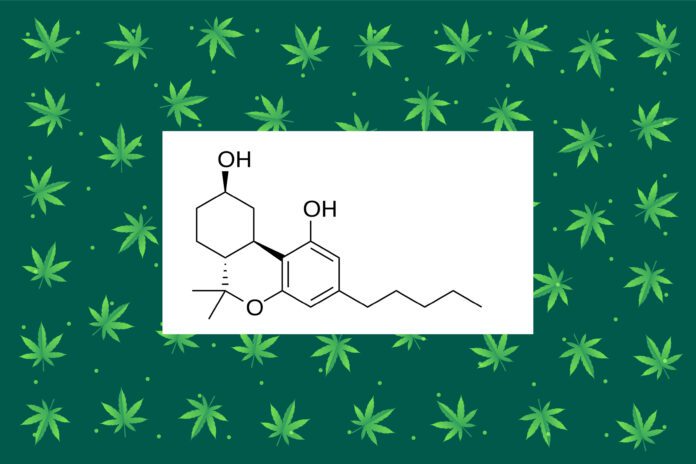With countless cannabis compounds out there, it’s tough to familiarize yourself with all of them. Here at Sociedelic, we focus on some of the lesser-known cannabinoids that don’t get as much attention as THC and CBD. You may have heard of CBD and THC, but what about Hexahydrocannabinol (HHC)?
The latest addition to this club of new cannabinoids is HHC. Hexahydrocannabinol is a cannabinoid that has been gaining popularity in the wellness space for its similar effects to Delta-9 tetrahydrocannabinol.
Table of contents
HHC is a minor cannabinoid, occurring naturally in cannabis in small amounts and is quickly becoming popular among those looking for the benefits of cannabis. Commercial production of HHC is just getting off the ground, so it’s still not widely known.
While most of the cannabis research is centered around Cannabidiol (CBD) and Tetrahydrocannabinol (THC), this cannabinoid hasn’t been as extensively researched.
Let’s take a closer look at this exciting new chemical that may be the missing link in realizing the full potential of the cannabis plant.

What is HHC (Hexahydrocannabinol)?
HHC is difficult to understand because it is relatively new, and just a few companies are selling it, primarily as vape carts. The cannabinoid has a lot of promise; don’t be shocked if you start hearing more about it soon.
HHC is a semi-synthetic cannabinoid from hemp, although it is developed in a laboratory. Molecules are taken from the plant and combined with a catalyst to create a new substance with similar effects as natural hemp.
HHC is a cannabinoid that has a similar chemical structure to Delta-9, the main psychoactive component of cannabis, containing two additional hydrogen atoms. Because of this, HHC has a longer shelf life than THC.
The THC molecule is made of double carbon bonds that are pulled apart during the hydrogenation process, which creates HHC. Simply stated, HHC is a type of THC without any double bonds in its chemical structure. It is the opposite molecule as CBN, which forms when THC decarboxylates and adds extra double bonds.
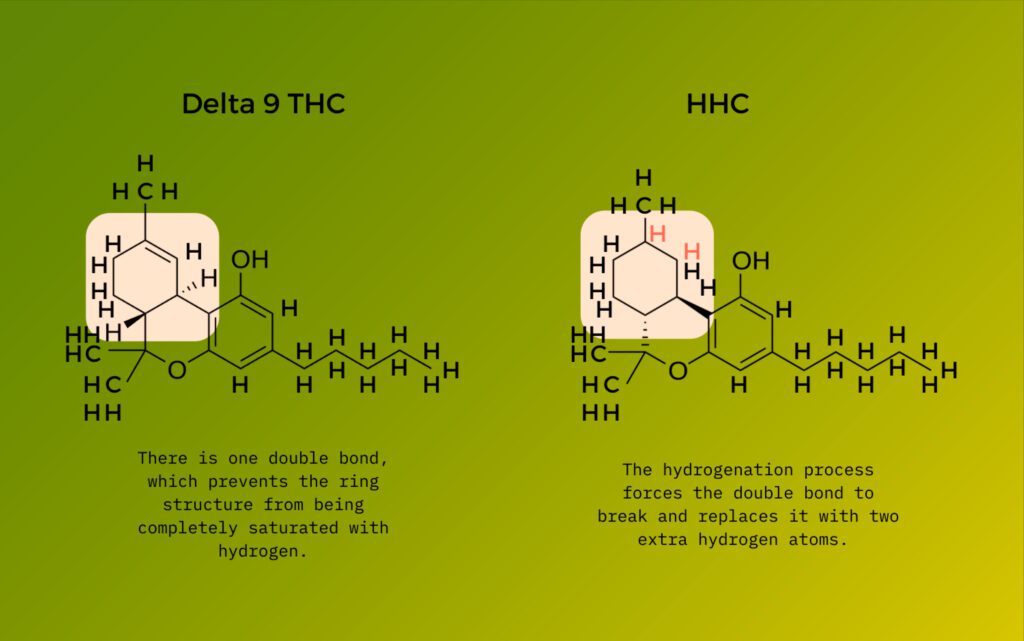
Although it may not seem like much, this change in geometry alters the molecule’s binding affinity for CB1 and CB2 endocannabinoid receptors, as well as TRP pain receptors.
This change not only makes the molecule much more stable, but it also significantly increases its shelf life.
Scientists and people who use marijuana recreationally are interested in whether HHC can be absorbed more efficiently by the body than cannabinoids that occur naturally.
Not all cannabinoids are completely absorbed by the body, which then results in a lower proportion of these compounds entering circulation. This also reduces our experience of the full benefits that these compounds offer.
Scientists predict that when it comes to HHC, more of the substance will be broken down and our endocannabinoid systems will be able to fully utilize the compound in a way we’ve never seen before.
How Did It Begin?
In the early days of HHC, it was commonly referred to as “the giggle drug”. This is because HHC tends to make people feel more relaxed and happy. HHC is also known for its ability to relieve pain, making it a popular choice for medical patients.
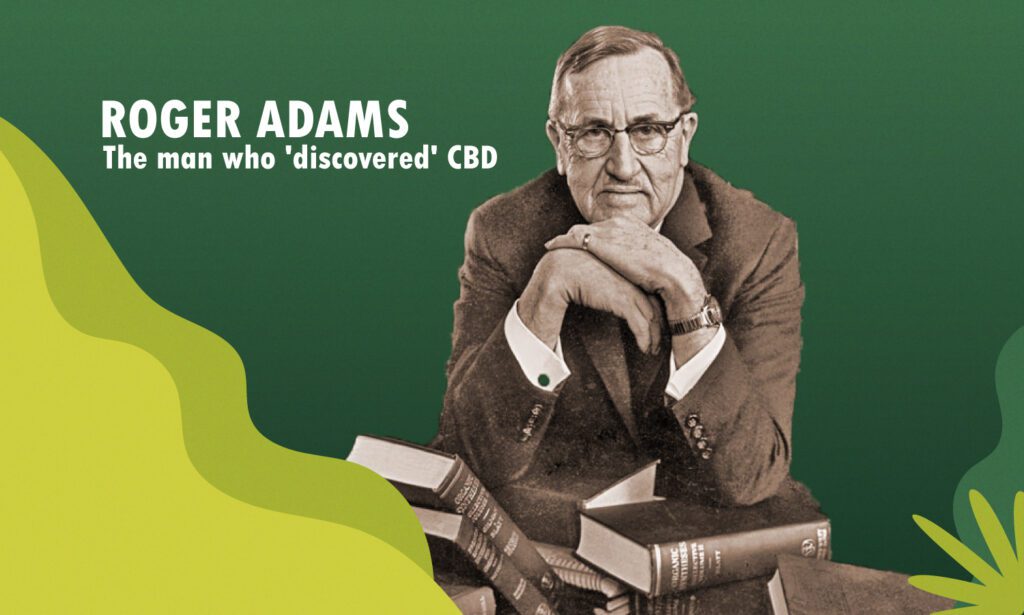
The discovery of CBD was a huge step for cannabis enthusiasts, as it is the non-psychoactive compound in marijuana. The scientist who discovered and isolated CBD in the 1940s, Roger Adams, an American organic chemist at the University of Illinois, created Hexahydrocannabinol (HHC) during that period too.
In 1947, Roger Adams was the first to synthesize HHC from natural THC sourced from Cannabis sativa. He created HHC by adding hydrogen molecules to delta-9 THC; this is known as “hydrogenation.”
We also understand that utilizing hydrogen atoms to saturate the molecule extends its shelf life significantly. There are numerous different forms of HHC, including HU211, 7-OH-HHC, and HU243, in addition to the original HHC.
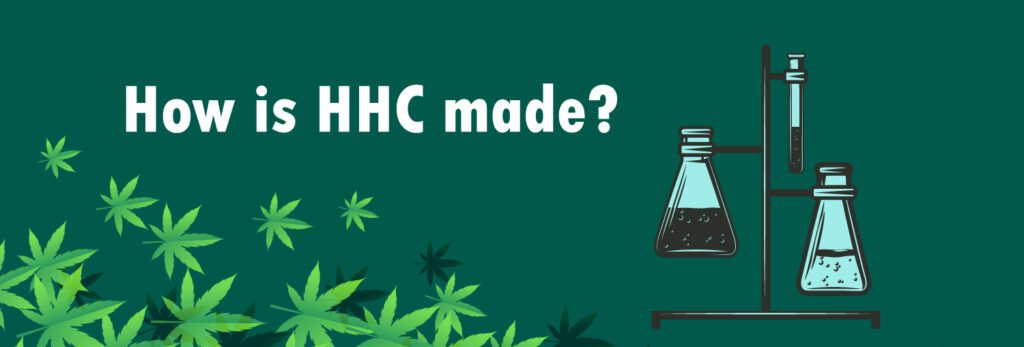
How is HHC produced?
There are several steps in the process. To begin, CBD is extracted from raw hemp and distilled into a powder form. After that though, things get more complicated.
While HHC was originally created from cannabis-derived THC, it can also be converted from hemp-based cannabinoids like Delta-8 and Delta-9 THC.
The HHC manufacturing process is a chemical reaction that occurs inside a reactor. CBD goes in, HHC comes out.
The most common method for HHC to be transformed is through hydrogenation in a laboratory, which requires the addition of hydrogen and the use of a metal catalyst such as palladium, according to Dr. Greg Gerdeman, Ph.D., cannabis scientist and educator and the co-founder of NASHCX (Nashville Commodities Exchange).
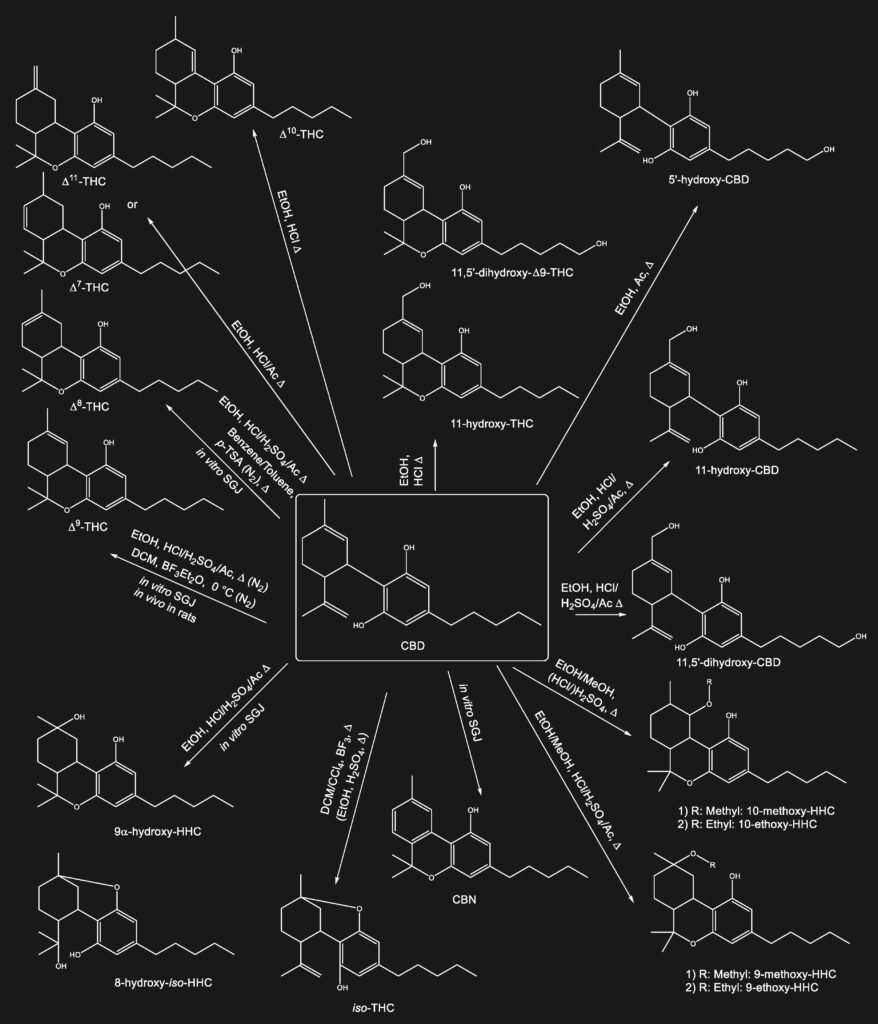
HHC Effects and Benefits
So far, HHC has shown promise in preclinical studies, but human studies are still needed to confirm its efficacy. HHC is extracted from cannabis plants and is currently available in topical form. HHC is not yet widely available, but as more research is conducted, we expect to see HHC become more mainstream.
A study from 2011 found that some analogs of HHC were highly effective in inhibiting breast cancer cell growth and tumor formation. However, more research is necessary to make firm conclusions here.
In 2007, Japanese researchers published a paper discussing HHC’s potential as a pain reliever based on observations made in mice. However, it is still too soon to tell if HHC will be successful as a therapeutic drug.
Consumers generally feel pain relief, anxiety relief, relaxation, cerebral and body high, and joy after taking this unique cannabinoid.
HHC has similar effects to THC, but it is less powerful. Experts believe that it is weaker than Delta-9 and stronger than Delta-8, although there’s no agreement on this.
An important aspect of this compound is its high bioavailability, meaning that your body can easily break it down and absorb it.
THC and CBD, on the other hand, are not 100% bioavailable, which means they aren’t entirely absorbed by the body. To put it another way, the amount of these cannabinoids that enter our circulation isn’t as high as it might be. As a result, we don’t obtain all of the compound’s benefits. HHC, on the other hand, can metabolize faster in our bodies and generate greater effects overall.
The effects of HHC can vary, depending on the individual’s tolerance level and body system.
Is HHC Safe to Consume?
Because cannabis-derived products are new, their effects have not been studied enough to know all the short and long term impacts. Also, there is no one set dose for consuming these products.
Another challenge is regulation, as cannabis-derived products like HHC are not strictly regulated in states where adult use is legal. This means that HHC producers and retailers are not required to test their products for potency and purity, creating a potential safety risk for consumers.
Always be cautious when handling new substances and make sure to do your research on cannabis-derived products before you buy them. Purchase from dispensaries that you only trust to avoid any issues.
If you’re looking for a quality source of HHC, be sure to check out Shayana Shop. They offer many HHC products that are perfect for any cannabis enthusiast, enough to enjoy all the benefits of Cannabis Sativa L.
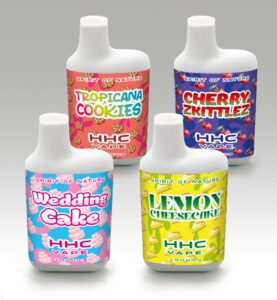
With years of experience in the industry, you can trust Shayana to provide you with the best products possible containing cannabinoids and 100% natural extracts, including HHC, CBD, CBG, and CBC. Other cannabinoids, such as CBDa, CBDv, CBL, and others, are also included in the recipe to guarantee the entourage effect and give a sense of well-being.
Their line of HHC Vapes and their HHC Gummies offers plenty of options for you to try this exciting cannabinoid.
Is HHC Detected on a Drug Test?
This cannabinoid, which has a similar chemical structure to THC, may produce positive results for users. However, this is based only on personal accounts and not scientific evidence.
The cannabis community seems to be undecided about this. Some users report that they were able to pass their test without any problems, while others have failed after using HHC only a couple of times.
Although people claim that HHC will not show up on a drug test, there is no evidence to back this up. If you have an upcoming drug test, it’s better to be safe than sorry and avoid consuming HHC.
Is it legal to use HHC?
The legal status of HHC is not defined by law, and it is open to interpretation. HHC has been on the market for decades, but it has only been available as a consumer product for a few months. Because it is so new, there are no established rules or regulations governing its production and distribution.
Although HHC is often claimed to be a legal alternative to THC in some areas, the issue can be fairly complex.
Given that HHC is so similar to THC, there are areas where it’s illegal. However, because it comes from industrial hemp, some places like the United States may consider it legal due to the 2018 Farm Bill.
While HHC use is technically legal in Europe and elsewhere, that could theoretically change in the future. So, it’s best to always stay updated on your local laws concerning this substance.
If you’re interested in trying HHC, be sure to talk to your doctor first. HHC is not currently regulated by the FDA, so it’s important to do your research and purchase HHC from a reputable source. Stay tuned for more updates on HHC – we’ll be sure to keep you posted!
Here at Sociedelic, it is our responsibility to provide you with everything you need to know about the cannabis industry. We understand that terms and concepts can be overwhelming for consumers; that’s why we’ve made it our mission to provide you with all the information you need to make informed choices on your cannabis journey.
Have you heard of HHC? What are your thoughts? Let us know in the comments below!
